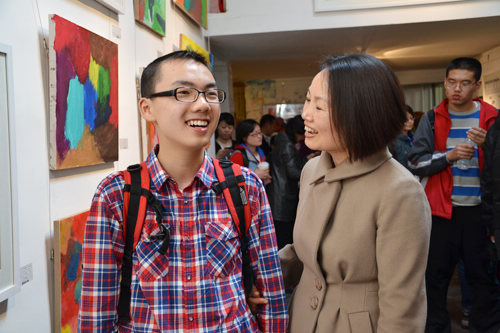|
 |
|
BEING WITH YOU: Xiao Jingkang (left) and his mother Zou Wen attend an exhibition in 798 Art Zone in Beijing on March 31 (LI FANGFANG) |
At the age of 3, Xiao Jingkang, always known as Kangkang, was supposed to attend kindergarten in Beijing, but he couldn't, because he didn't talk—not to his friends, not to his teachers, not even to his parents. Kangkang was diagnosed with moderate-to-acute autism and unable to communicate with people. He also suffers from severe mood swings.
"I couldn't help crying when I heard the result. My whole world collapsed," said his mother Zou Wen when recalling the day 11 years ago.
Despite a short battle with depression, Zou and her husband pulled themselves together and did their best to provide for Kangkang. They sent Kangkang to training centers for autistic children, which taught the kids how to speak, paint, swim, and sing.
Today, Kangkang is 14. He can draw, swim and even cook for his parents. He's still a bit nervous when meeting new people, but he's never impolite. His paintings have been exhibited at the opening ceremony of an art studio, founded by Li Hua, who has been a volunteer working with autistic children for three years. Li is a member of the Beijing Association for Rehabilitation of Autistic Children (BARAC), a social organization aiming to provide care and support for autistic families.
Generally, autistic children beginning therapy before the age of 3 make noticeable progress, according to Jia Meixiang, a psychiatrist from the Institute of Mental Health of Peking University and an expert on autism.
"Parents must face the reality and get rid of negative emotions as soon as possible. Their timely scientific help will alleviate children's autistic symptoms," Jia said.
Kangkang entered an elementary school in Beijing. Thanks to the protection and understanding of the teachers and classmates, the boy began having a social life and is getting better.
Social awareness
Children with autism typically exhibit impaired social interaction abilities marked by repetitive behaviors and narrow interests. Many of them cannot express their feelings through language or control their emotions. However, some are talented in and enthusiastic about music, fine arts and mathematics.
| 